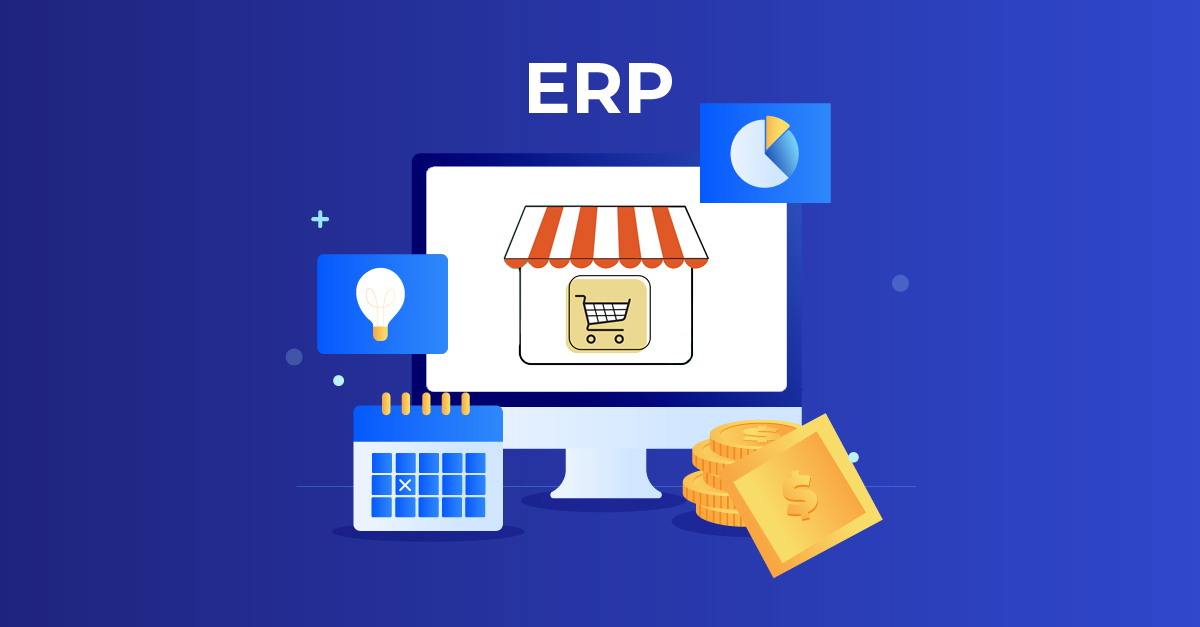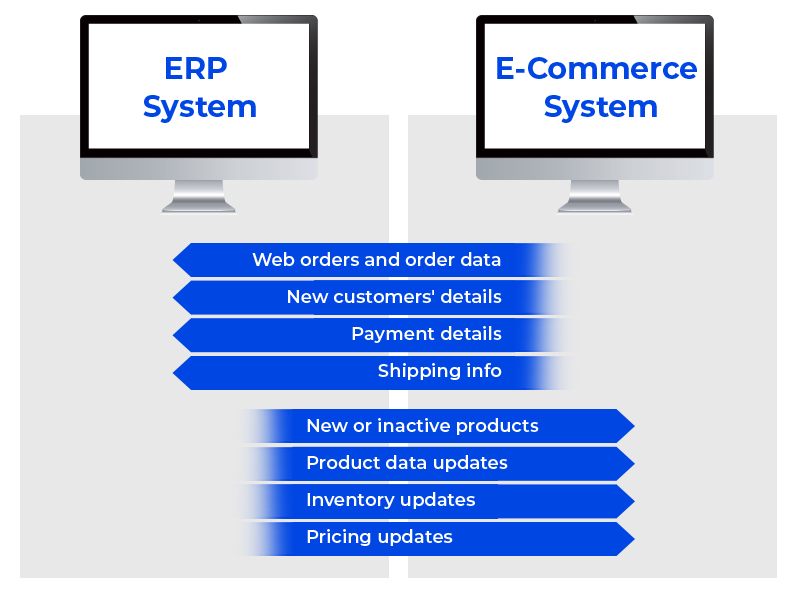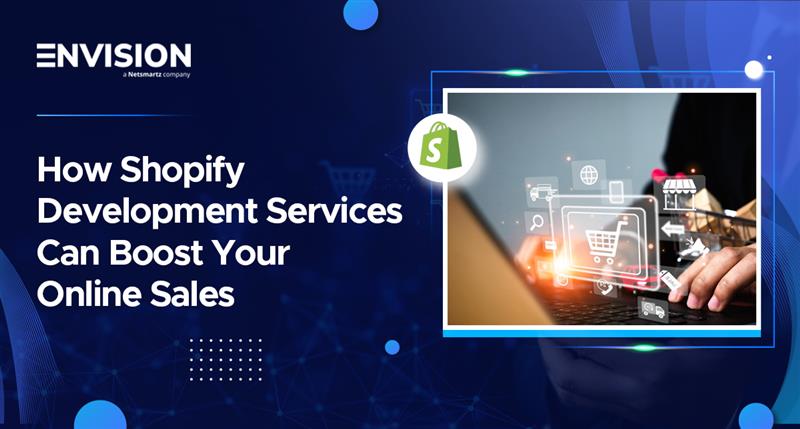How Does ERP Integration Help in Effective eCommerce Store Management?
-
 Jess Mann
Jess Mann
- 3 years

As a business scales, adds new sales channels and enters new markets, it becomes hard to manage and profitably leverage the data it collects. That is where ERP comes into play!
If you plan to scale your eCommerce business and are not yet done with ERP integration, your business is at risk. Every time you get an order and manually enter it to your ERP, manage your product inventory or add new product data to your website, you are not just wasting time but increasing the possibility of errors.
Here are some of the consequences that you might have to face because of these mistakes:
- Incorrect product data
- Confusing stock levels
- Wrong product prices
- Missing orders
All of the above issues can affect your business reputation negatively while impacting your store’s customer experience. And once a customer encounters any such problem with your business, you will not be able to retail them at any cost in the future.
Thus, why not invest in eliminating every chance of letting this happen? You can do this by investing in ERP integration carefully. Let’s know more about the process in this blog.
What are the Best Practices for ERP and eCommerce Integrations?
ERP is basically an application or software that automates an organization’s business processes. It has a database that gathers input from several business divisions like marketing, manufacturing, accounting, and others to store and provide the right information when needed.
This information makes it easy for decision-makers to analyze what is going on in a business and what needs to be done to improve its performance. For growing eCommerce businesses, an ERP system is crucial to streamline business processes and easily handle new targets.
Here is how an ERP functions:

That’s all about how data flows two-way when you integrate your eCommerce system with an ERP for better eCommerce store management.
Your eCommerce website sends ERP the following data:
- Web orders and order data, including product details and quantity, so that the right order gets dispatched and inventory gets updated
- All details of new customers like name, contact details, and what they searched along with updated information about old customers
- Payment details so that you can get paid and delivery information so that the order is sent to the right address.
Similarly, the ERP system sends the following data to your eCommerce website:
- Data about all new products added and products that were discontinued. It aims to display the right information on your eCommerce website all the time.
- Real-time inventory updates so that your customers can only order items that are at present available in your stock. The goal here is to avoid any disappointment caused by order cancellation due to low inventory levels.
- Pricing updates so that your customers always see the updated prices no matter when supplier prices change, or exchange rates increase.
So, that’s how ERP integration works with eCommerce platforms. However, to make it work efficiently, you need to follow these best practices while doing the integration:
1. Access Your Current Systems
Before you proceed with ERP integration, you first need to check the integration capabilities of the ERP system you choose and the best-of-breed platform you are using. There are some cases where external apps don’t have an API or have a restrictive API, making the integration a tedious task.
2. Aim for a Complete Two-Way Integration Process
ERP and eCommerce integration is a one-time task (Obviously you can make changes later on). So, make sure you do it carefully and consider every feature you need to integrate to fulfill your business needs.
Not just present but consider future goals as well. For example, find what functions you need if your business expands or your multichannel strategy grows. In addition, all the two-way processes that are mentioned above must be included in your integration.
Moreover, it is essential to make sure that you invest in bidirectional integration because only that way you will be able to leverage it to the fullest.
3. Hire Reliable Partners
The people who hire for implementing this integration can make or break your project. So, make sure you hire the ones very carefully. Always search for partners with proven expertise in dealing with such projects and schedule enough meetings with them so that both of your teams stay on the same page.
Clearly mention your company’s goals and limits, and try to ask about their process before starting. It is always a good idea to have clarity on challenges, risks, timelines, and hidden costs associated with the project.

4. Make Sure You Perform Testing
Many companies take testing the framework lightly and then face the consequences later on. Sometimes data is not properly displayed in the first run, and updates do not reflect as fast as they should. You must test all these things to ensure no discrepancy in your eCommerce system. Having said that, let’s now look at how ERP integration with your eCommerce website will help your business.
Why Integrate ERP With eCommerce: 4 Benefits That Will Help You In eCommerce Store Management
Obviously, if you invest in integration, you will expect benefits in return. So, what will you get if you integrate the two systems? What benefits can you expect? Let’s find out:
1. Better Use of Data
Data is a goldmine for eCommerce businesses, and most of the data is stored in ERPs. So, if you integrate it with your eCommerce system, you will be able to drive better insights and reports to streamline your sales and marketing operations.
Data visibility will empower your teams to take action confidently while increasing sales and growing revenues. ERP integration leads to personalized reporting that results in better demand management, inventory management, and supplier projections.
2. Improved Customer Experience
A pleasant customer experience is essential for eCommerce consumers. With better personalization and account tracking by ERP integration, businesses can build exceptional experiences for their customers. A well-integrated eCommerce platform with an ERP can deliver a great experience using data about users’ likes, dislikes, fulfillment preferences, order history, and other things.
By automating these experiences, businesses can eliminate the need to address every customer over calls and messages about their order confirmation and product availability, resulting in streamlined business processes and increased team productivity.
Moreover, with an ERP system sending data directly to an eCommerce platform, your customers will have access to real-time information about your products, even at midnight or during weekends. They will be able to check real-time inventory levels, the status of their orders, and many other things, resulting in improved CX.
3. Effective Pricing Strategies
eCommerce businesses follow complex pricing models, especially ones that rely on B2B models. Some of them also generate pricing dynamically depending on the changing inventory.
These businesses may want to display discounted prices for some customers, depending on their relationship with business or order value. As a business grows, their product types, catalogs, and other factors affecting price increase as well.
And because B2b businesses rely on ERP systems to centralize the data, it makes perfect sense to integrate it with an eCommerce website to make data flow easier and hassle-free.
In addition, integration helps businesses enable many automated features that are crucial for a B2B business, for example, onsite currency conversion, tax calculations, and personalized product catalogs depending on the shoppers’ ordering habits.
4. Accuracy All-Around
When information flows between your two systems accurately and reliably, your sales team can confidently sell what they see without worrying about the backend issues.
Also, your financial reporting will become more precise, including your ordering data and eCommerce sales. This improves your overall knowledge about your business and permits you to manage it more effectively.
Wrapping Up
Now, if you are planning to leverage ERP integration with your eCommerce system to the fullest, do not wait for another year and take the required action today. It will help you immensely in eCommerce store management while driving increased sales.
The eCommerce industry is growing fast, and you need to up your commerce game in order to perform better. Contact experts at Envision eCommerce for any help!












